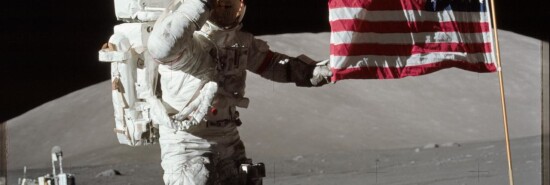
Fifty years after Apollo 17, why have we not gone back to the moon?
Mark Whittington
Video Embed
Fifty years ago on Dec. 14, Gene Cernan, the commander of Apollo 17, spoke the last words a human being has spoken on the moon’s surface: “As we leave the Moon at Taurus-Littrow, we leave as we came, and, God willing, we shall return, with peace and hope for all mankind.”
Cernan’s wish has yet to be fulfilled. Indeed, he departed this life before human beings could return to the moon. The Artemis Project promises that, at long last, human footsteps will tread the lunar surface once again after over five decades. But why has it taken so long?
CHINA RACING TO BEAT THE US IN A LOOMING LUNAR GOLD RUSH
The Apollo program died a premature death because too many political and media elites thought that money spent going to the moon should be spent on earthly social programs. Besides, Apollo had already achieved President John F. Kennedy’s challenge to send a man to the moon and guide him safely back to Earth. In fact, we did it five more times.
Twenty years after the first Apollo moon landing, then-President George H. W. Bush stood in front of the National Air and Space Museum, with the original Apollo 11 astronauts in attendance, and offered what would become the Space Exploration Initiative. He declared his initiative to be “back to the moon. Back to the future. And this time, back to stay. And then a journey into tomorrow, a journey to another planet: a manned mission to Mars.”
But congressional Democrats were in no mood to fund a new space exploration project. Then-Sen. Al Gore (D-TN) scoffed that Bush needed to go on a “journey to reality.” The Space Exploration Initiative was stillborn. President Bill Clinton canceled the program.
In January 2004, in the wake of the Columbia disaster, President George W. Bush revived the idea of going back to the moon and on to Mars. Project Constellation, as it was dubbed, was better received by Congress this time. However, the program ran into budget overruns and schedule slippages that had become sadly typical of NASA programs in recent decades.
President Barack Obama canceled the program. In a speech at the Kennedy Space Center, he offered a snarky comment about going to the moon. “We’ve been there before,” he said. The program with which he replaced Constellation, dubbed the Journey to Mars, is in hindsight considered a Potemkin space project. It went nowhere.
It fell to President Donald Trump to try to send humans back to the moon and on to Mars. And it looks as if Trump’s initiative, Project Artemis, has succeeded in garnering the political support that the other two space exploration initiatives failed to get. There are three reasons Artemis has achieved blastoff.
First, Trump chose a young congressman named Jim Bridenstine as NASA’s administrator. After a rocky confirmation process, Bridenstine set out to win congressional support for Artemis from both sides of the aisle, even from some who had opposed his nomination. He succeeded so well that Joe Biden adopted Artemis as his own when he became president.
Mike Gold, then NASA’s associate administrator for space policy, helped to form international support for the return to the moon through the Artemis Accords, an agreement on rules for space exploration and the economic development of other worlds. Currently, 21 nations have signed the accords, with more to follow.
Elon Musk’s SpaceX has proven the efficacy of having commercial companies fly crewed spacecraft. SpaceX will provide the Human Landing System to take people to the lunar surface at a fraction of the cost NASA would have spent in-house.
Human beings are finally going back to the moon. But it should not have taken 50 years to do so. One can imagine an alternate history, such as the TV series For All Mankind or the book trilogy Children of Apollo, in which we never stopped going to the moon. With the Artemis program finally proceeding apace, it is better late than never.
CLICK HERE TO READ MORE FROM THE WASHINGTON EXAMINER
Mark Whittington, who writes frequently about space and politics, has published a political study of space exploration titled Why is It So Hard to Go Back to the Moon?, as well as The Moon, Mars and Beyond, and, most recently, Why is America Going Back to the Moon? He blogs at Curmudgeons Corner.
